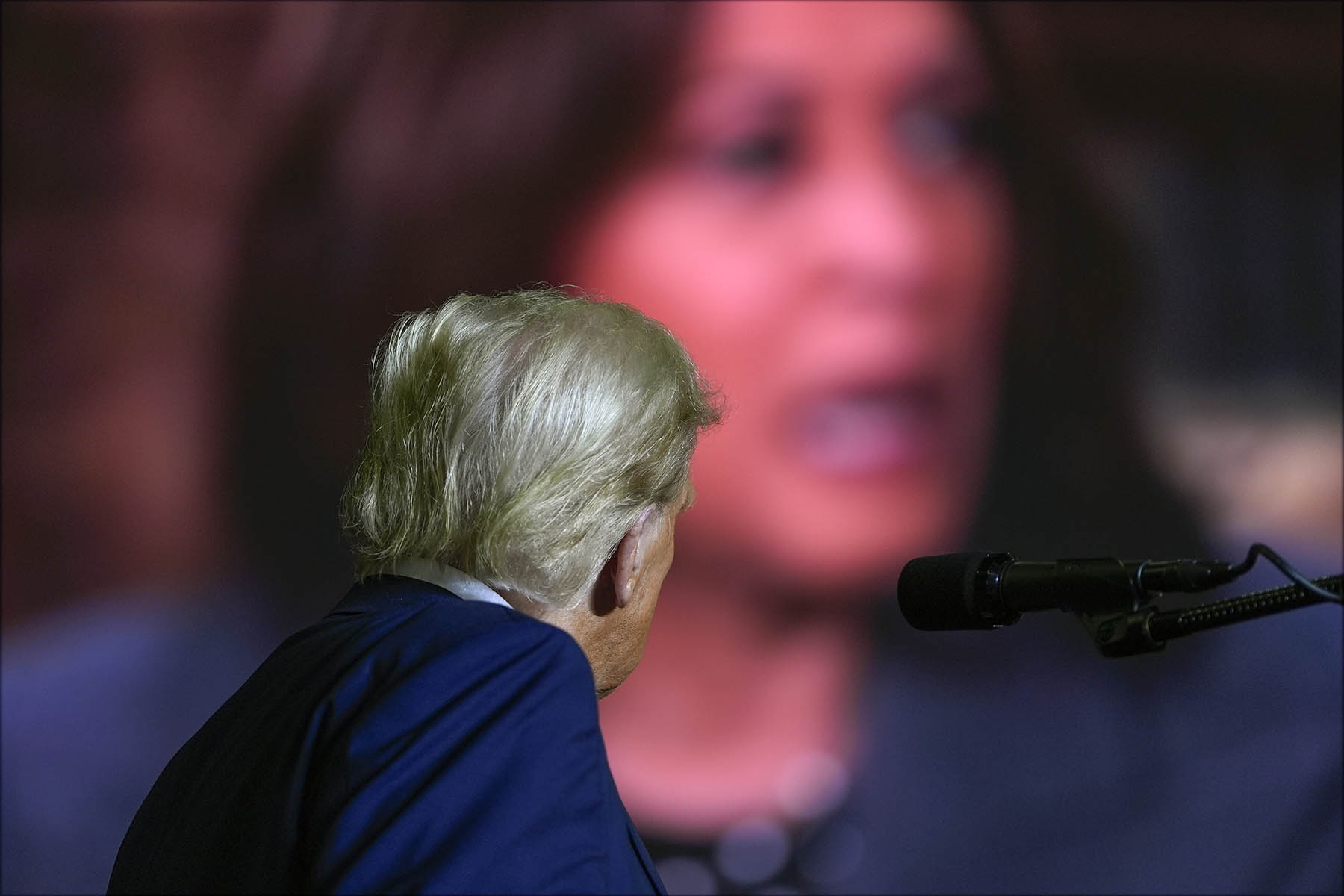America’s presidential election is just days away. The race is historically tight, and the result is impossible to predict. Yet some far-right influencers appear convinced the so-called deep state will intervene to ensure Democratic candidate Kamala Harris wins. The presidency, they claim, will be stolen from Trump, “again,” by an unholy axis of elites, technocrats, and progressives.
The notion that Trump triumphed in the 2020 polls is, of course, false. Exhaustive court challenges, media investigations, and expert data analyses have established this many times over. If Harris becomes the next US president, it will not be because shadowy establishment forces anointed her. It will be because the former president was a deeply flawed candidate whose erratic campaign and dark vision of America did not resonate with enough voters.
Still, luminaries within the Make America Great Again—MAGA—movement will harness a Democratic win, should there be one, to claim moral victory. The strategy of radical populism includes amplifying warped or unverified stories that normalize extreme suspicion, among some voters, around state overreach or liberal identity politics. The same dynamic is present among extreme left-wing activists but in an inverse way.
Indeed, it used to be that foreign actors trying to sow division and confusion in America were the prime source of fake content. Not anymore. Increasingly, adversaries of the United States just need to propel the tales emerging from a deeply polarized American society. “You go back again, way back in 2016, oftentimes the Russians had to plant the false implication and then elevate it,” Senator Mark Warner, chair of the Senate Intelligence Committee, said to an audience at a recent event in Washington, DC. “But now they can simply elevate or promote the crazy things that Americans say.”
This highlights an underappreciated aspect of misinformation: toxic untruths often go viral because partisans actively want them to.
Around two-thirds of Republicans cling to the belief that Trump won the last election. And surveys suggest some four in ten American adults agree world events are dictated by a secret cabal of globalist power brokers. Another Trump loss would thus further inflame the sense of victimhood and systemic bias endemic among millions of the MAGA faithful. It will self-confirm their intellectual and emotional investment in the narrative that they are being culturally persecuted and politically disenfranchised.
In fact, political action groups allied with Trump have been insisting for months, in fundraising emails and at events, that mass voter fraud is already underway. They claim mail-in ballots lack verification. There are also allusions to the “Great Replacement” theory—a racist fantasy that Democrats are about to stuff ballot boxes with votes from undocumented immigrants. Yet American election laws are clear that only citizens can vote in federal polls.
Another persistent myth is that voting machines located near Wi-Fi networks can be hacked. On August 12, Tina Peters, a county elections clerk in Colorado, was found guilty of giving unauthorized persons access to voting machines in 2020. The next day, she appeared on right-wing cable media to claim her conviction was a sham. Peters said she was a whistleblower being silenced by the deep state for her knowledge that Serbian agents rigged the 2020 election by tampering with voting machine software.
Conservative grassroots organizations are being more proactive this time around. In early September, True the Vote—a so-called election intelligence project based in Houston, Texas—released a new VoteAlert app to help users “report suspicious activity.” This is meant to inform a “boots-on-the-ground coalition dedicated to safeguarding our representative republic.”
Far-right “truth tellers” are similarly warning about covert efforts to derail Trump’s campaign. Conspiracy merchant Alex Jones, the founder of the media outlet InfoWars, says Trump’s near assassination in Butler, Pennsylvania, in July was organized by the US government. The day after the Secret Service foiled another assassination attempt targeting Trump—at his Florida golf club, on September 15—a guest on Jones’s flagship talk show likewise suggested the suspect, fifty-eight-year-old Ryan Wesley Routh, was aided by the Central Intelligence Agency. The segment has garnered 4.4 million views since it first aired.
Tucker Carlson has posted there are “remarkable” parallels between what Trump is experiencing today and the Watergate scandal, which Carlson believes was concocted by the deep state to oust President Richard Nixon in the early 1970s. The former Fox News personality has 14 million followers on X alone. He also has his own media network and the second-highest-ranked podcast on Spotify. This reach has enabled him to popularize the utterly unsubstantiated theory that Harris replacing Joe Biden as the Democrats’ nominee was actually a bloodless coup within the executive branch of the US government.
After the presidential debate on September 10, Laura Loomer, an avowed Christian nationalist, suggested without evidence that ABC News producers fed Kamala Harris questions through an earpiece during the event. A couple of days later, Elon Musk—arguably now the largest vector of right-wing propaganda—reposted something similar.
A chorus of MAGA figures then denounced, as political sabotage, the Federal Reserve’s decision, on September 18, to lower interest rates. Stephen Moore, a senior fellow at the Heritage Foundation, a think tank, argued on Sean Hannity’s Fox News program that the size and timing of the cut were long premeditated: “They waited four years to do this.” The supposed goal being to juice the economy in the Democrats’ favour on the eve of the election.
Voices from the far-right corners of the internet, including that of Republican firebrand Marjorie Taylor Greene, have also floated the physics-defying conspiracy theories that recent deadly storms Hurricane Helene and Hurricane Milton were purposefully geoengineered to “wipe out” Trump-leaning districts.
In a lengthy interview with the New York Times published this summer, Steve Bannon, Trump’s former chief strategist, claimed that the MAGA movement was locked in a spiritual struggle of good versus evil. “This is a military headquarters for a populist revolt,” Bannon declared from the studio for his podcast, The War Room. “Everything is narrative,” he suggested—and the search for common ground is self-defeating. “We’re not reasonable. We’re unreasonable because we’re fighting for a republic. And we’re never going to be reasonable until we get what we achieve. We’re not looking to compromise. We’re looking to win.”
Oover the past decade, such zero-sum tribalism has flourished in Western societies. For many citizens—especially those living extremely online lives—steeping themselves in a certain ideology or social identity provides a sense of purpose and belonging. It provides an antidote to the banality and instability of everyday life. This can be true even after someone internally recognizes how their selected creed ignores inconvenient facts; the pull of community is simply too strong. A recent study by the Harvard Kennedy School, for example, found that the fact checking of social media posts containing fabricated claims that the 2020 election was stolen made Trump voters believe the falsehoods even more.
Social psychologists call this the devoted actor phenomenon. Classic liberalists view humans as rational beings who instinctively prioritize their own interests above all else. By contrast, devoted actors will disregard their own security, knowledge, and moral framework to strengthen bonds with their chosen community. This includes resorting to outsize aggression against any threats, real or perceived, to their in-group.
When users across the political spectrum share conspiracy theories with their networks, it is thus not necessarily because they have fallen prey to deception. Rather, trolling the opposition is a public sign of allegiance to their tribe. In MAGA parlance, this is known as “owning the libs.”
This paradox was on full display in September, after Republican vice presidential candidate J. D. Vance endorsed the false story that Haitian immigrants were eating residents’ pets in Springfield, Ohio. Vance himself posted that the rumours could “turn out to be false.” And local authorities repeatedly stressed that there was no evidence the claim was true. The woman in Springfield who first highlighted the story on Facebook even admitted she had no first-hand knowledge such a thing had ever happened. Yet Vance doubled down on the accusations against Haitians for several weeks afterward, because they held political currency among Republican voters.
“If you have to rationalize your behaviour, you can convince yourself of anything,” former Republican lawmaker Adam Kinzinger said in a recent interview with The Atlantic. A one-time rising star within the GOP, he was ostracized by his peers and received death threats for participating in investigations into the ransacking of the US Capitol on January 6, 2021. “I have come to believe in my life that people, more than they fear death, they fear not belonging,” Kinzinger says. “I think there are more people that would step in front of a train to save a child than there are people that would be willing to leave their party and be an outlier.”
Republicans are already laying the groundwork to hijack the election certification process on the basis of their impression that Trump may lose. Should Harris win, narratives laced with misinformation and conspiracy theories born within the MAGA-sphere will instantly ricochet across social media—especially if there is no definitive winner on election night, given the lag time required to count mail-in ballots. Pre-emptive lawsuits have already been launched in the swing states of Michigan, Nevada, and North Carolina to challenge the integrity of the election.
These campaigns would all be unleashed as social media companies across the board have been scaling back content safeguards. In August, Meta dropped its CrowdTangle tool, which helped researchers, journalists, and others uncover patterns of false and manipulated information on Facebook. Snapchat and Discord have reduced their trust and safety teams by between 20 percent and 30 percent, a researcher at the Tow Center for Digital Journalism at Columbia University recently told security outlet Defense One. Musk’s gutting of X’s content moderation staff is well known. As is the aversion of both TikTok and Telegram to vetting posts on their platforms.
Foreign actors looking to pour fuel on the fire might resort to an emerging tactic seen elsewhere in the world—the leaking of forged documents, created using artificial intelligence, to bolster fake claims. A worst-case scenario would see the mobilization of far-right militias, which have been openly planning, coordinating, and recruiting across more than 100 Facebook groups for months.
In an interview with the Financial Times in early September, former BBC journalist Gabriel Gatehouse, whose work has focused on the prevalence of conspiracy theories in US politics, was asked to predict whether there will be a repeat of the lie of the stolen election if Trump loses. “That’s not a matter of prediction. I would bet on it,” Gatehouse responded. “One story that we hear quite a lot about this election is democracy is on the ballot. This is make or break, Trump will try to dismantle it. But the other lot, they believe that democracy has already been stolen. It was stolen in 2020.” As for the possible consequences for the health of American society, Gatehouse offers a warning. “In a way, the election is not so much the important thing. It’s what happens after.”
The MAGA universe has been forged by shared grievances and the visceral belief that its constituents’ place in American society is under assault. Plus, many of the movement’s leading figures rely on peddling revisionist narratives as their source of wealth and celebrity. Democrats would therefore be wise to avoid revelling too much in earning a Harris victory, if it comes to pass. Another Trump loss might ultimately do almost as much to galvanize the MAGA cause as a second Trump presidency would.
Reprinted, with permission, from the Centre for International Governance Innovation.





